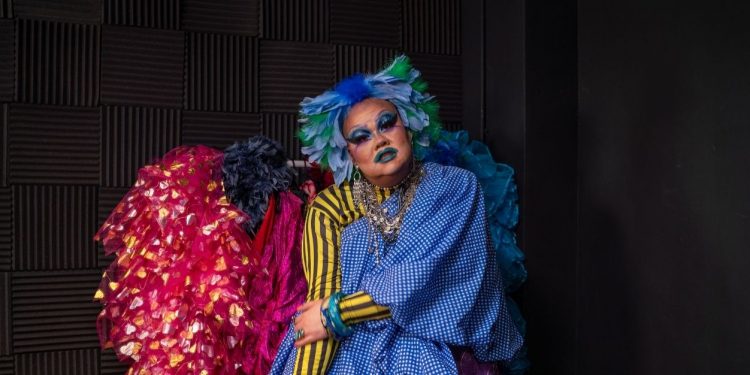Becca D’Bus’ roots in drag began with a passion for performance art.
“I thought I wanted to be a performance artist in a very self-serious, ‘I want to be in a gallery and do weird things with my body’ sense of that term,” she laughs.
She was pursuing theatre studies and marketing in university in Boston, but had always maintained an interest in drag. It was her first job after college at a queer theatre company, The Theater Offensive, that allowed her to immerse herself more deeply into the flamboyant art form.
“I directed a guerilla street theatre troupe that did work in safer sex education and public parks where men have sex. Part of that was learning how to do sex education and outreach in clubs. People didn’t really want to talk to us that much,” she reveals.
“So one night, we thought we would go out in drag and see if that made us more effective. It did, and I stuck to it.”
She subsequently entered an amateur drag contest. Though she did not win, it marked a new beginning for the young performer: “[I] realised that I could do and say a lot of things I wanted to do and say in performance art, in drag.”
Becca, also known as Eugene Tan, spent the next few years exploring Boston’s drag circuit as a performer, but returned to Singapore in 2010. She eventually established RIOT! in 2015, a regular drag revue which was held at celebrated venues in the likes of Lulu’s Lounge and Hard Rock Cafe.
TheHomeGround Asia caught up with Becca to find out more about her creative process, the local drag circuit, and what she envisions for the future of drag in Singapore.
(NOTE: This interview has been edited for length and clarity.)
Becca D’Bus: For my own understanding of the form, the question is, how do you rationalise the fact that you’re doing this thing [drag] that is, at its baseline, pretending to have a talent? What is there to get out of being in a room with somebody essentially living this fantasy? We can engage in sharing space, in what is subversive about our queerness and our proximity to each other, about what is attractive, sexually or otherwise, about what is beautiful. That’s the best way I can put it.
A drag queen can be breathtakingly beautiful, breathtakingly sexy. Or a drag queen can also be none of those things, and still insist that she is beautiful and sexy. And we’re all going to believe it in the moment. There’s something quite powerful about that.
TheHomeGround Asia: You’ve performed in both Boston and Singapore. How is the drag circuit different locally as compared to overseas? Are there any differences in terms of style?
BDB: I always say that drag is a regional art form. And that [is] increasingly tempered by the fact that there’s also this global juggernaut of a TV show called RuPaul’s Drag Race, and all the versions of it around the world. In a lot of ways, it’s a different form in Singapore than it is in Boston, in Boston than it is in New York, et cetera.
Yet, there’s also so much about it that is similar. We’re still a bunch of queers in a dressing room, getting into drag and putting on a show. In some ways, that speaks to a basic need for attention.
THG: What were some of the challenges that you faced initially in establishing RIOT!. How have these challenges evolved?
BDB: I think the challenge of doing anything interesting in Singapore – real estate’s expensive. And when real estate is expensive, it’s going to be very hard for you to find venues that want to take a chance on a show, or anything else that is not proven.
The pressures on space [are] always present, and always changing. At the baseline, the problem is that there isn’t enough space. My first ever venue decided that they wanted to refocus the business and evolve into something else. It was called Tab; it’s a lovely space actually. Huge. The next two venues I worked in closed [down], and the last venue that I was in before everything got shut down by the pandemic was Hard Rock Cafe.
Then the pandemic happened, and now we are in The Projector.
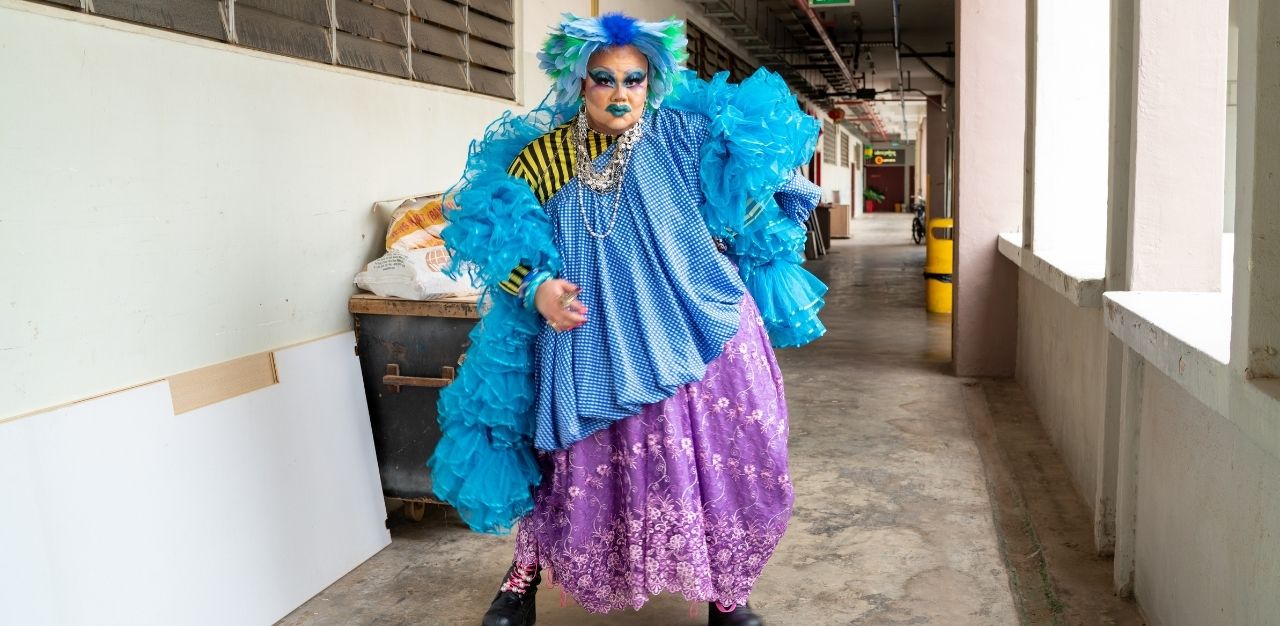
THG: Tell us a little more about how the pandemic affected RIOT! and the local drag scene. How did you adapt your performances to fit the needs of the audience?
BDB: There are a lot of drag queens who need drag to be a space in which they can express and fully become themselves. But I don’t think an audience ever really needs drag, and that’s kind of the point. In a way, it is because it is frivolous and ridiculous that you get to see some interesting things.
RIOT! got shut down, because it was built on this idea that we were going to be … in entertainment venues accompanied by drinking. It was strategic. We were working in venues that had entertainment licenses. It allowed us the latitude to work quite last minute, which is the truth for a lot of drag queens.
But I always think drag is so much better when you’re drunk. I can’t tell you how beautiful I am when you’re drunk, right? It’s incredible. It was always conceived to be in spaces where people were drinking.
April last year was when we finally shut down. We didn’t perform for a year in public spaces. And so, drag moved online. I did some of that, but I found it really depressing. The idea that I will get completely dressed up and made up in my own flat alone, performing for the camera with zero feedback from an audience, or return of energy from the audience was, first of all, exhausting. But also at some point, it’s like, this is my life. And something about that is deeply depressing. Make no mistake, the earliest parts of the pandemic were depressing for a lot of us who are performers. It was kind of [an] existential crisis, almost like, what is your life going to be, if we’re all locked down, and we can’t gather? As performers, very often our entire raison d’etre is to gather people.
THG: How are performances of the present different from past performances?
BDB: When it became possible to do live performance again that was socially distanced, we started to think about what this new version of a drag show would be [like]. It was clear that we couldn’t have as many people as we did then. 50 was the number that was being tossed around. So I found a venue, The Projector, [which] seats 108. We had 50 people in there, we could space people out. It’s a theatre, so people aren’t immediately drunk. But it also means that every show now has to be licensed. Every month, I have to submit my little IMDA application and explain drag to the IMDA officer, which is perhaps even more of an existential comedy than performing at home in front of a camera can be sometimes. But there we are. I call the show Commotion, because it’s a riot, but smaller.
When we were doing RIOT! at Hard Rock Cafe, it was possible to come and stand at the back of the room for $15. If you sat all the way up front in what we call the splash zone, it was $40 to sit at the table with three other people. So it’s $160 for a table of four. It’s now $36, and the closest you get to us is three metres away.
If your deepest pleasure, as it is for me, is to be in physical contact with the drag queen, I’m so sorry. You just have to imagine it. That was one of the pleasures of RIOT!; we were constantly climbing over people, drinking their drinks and shit. But we can’t do that anymore.
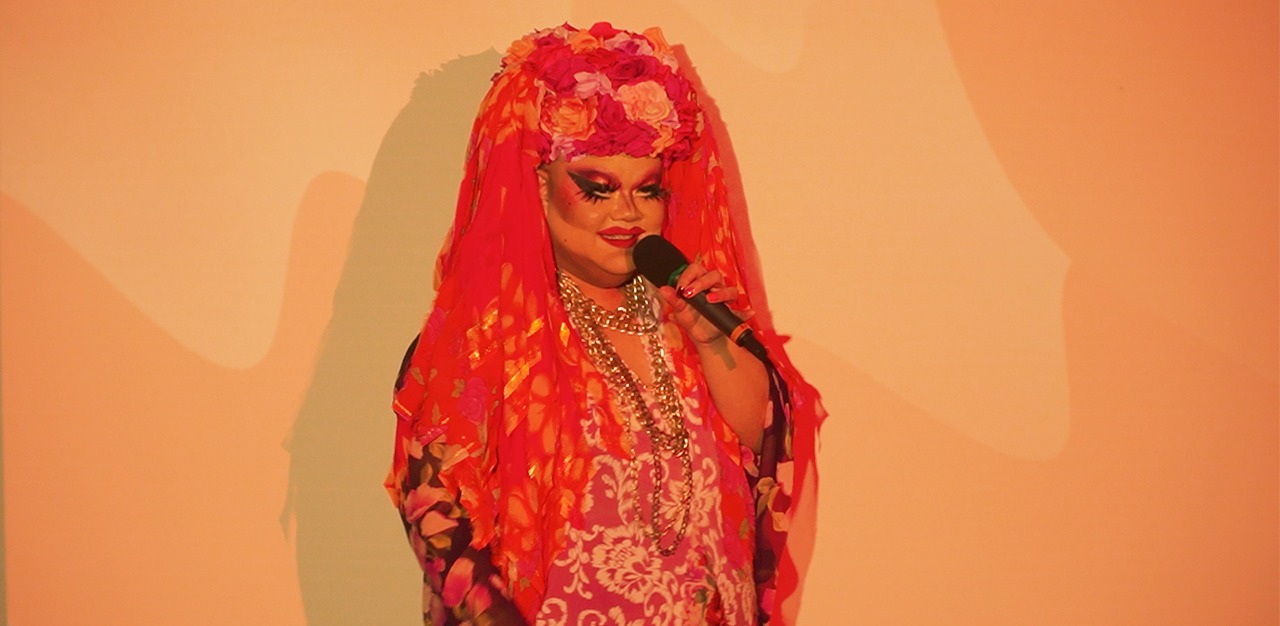
THG: What is your creative process behind conceptualising a show?
BDB: Panic. Procrastination. I would say panic and procrastination are both very important things, [along with] just having a point of view. For me, a very fundamental question of my drag is, why am I even performing? Does anybody need to see this? Does this enrich anybody’s life?
Making the kinds of performance that I make is work that’s happening in the background while I’m doing other things. You’re going like, ‘Oh, I’ve never thought of this song in that way’, or you sometimes mishear lyrics. That’s such fertile ground. Stuff like that is always interesting for me. But it’s hard to deliberately mishear lyrics, So maybe, my process is I have a f***** up brain.
It’s not rocket science. There have been times where I’ve done numbers where I’m not really into the music. Like, ‘Why did I pick it? Why did I decide to do this?’. And there are times when I’m like, ‘Oh, my God, I was really excited to do this, because I know it’s gonna hit in a particular way, and we’re all gonna have fun with it.’ And that’s that. For me, the pinnacle of achievement is that people are having fun. If there’s meaning to be had, all those things are great. But first, are we gonna have fun with this thing?
THG: You’ve also embarked on individual projects such as Cover Your Pie Hole. Can you tell us more about that?
BDB: [It started] because I make all my own costumes. I have a horrifyingly large, borderline unhealthy, amount of fabric. I’m not making these into the costumes anytime soon because where the hell are we gonna be performing anyway? That was part one – how [to] deal with this insane amount of fabric that I own.
Part two [came as] I was finding myself increasingly irritated with people who weren’t wearing masks in public. I actually found myself yelling [at a] woman who was trying to be real cute with her boyfriend at CHIJMES, constantly taking off her mask to take a selfie with [him]. I yelled, “Can you please cover your whore mouth?” [Then] I was like, this is the project. We’re going to make masks out of old costumes and fabric that was originally destined to be costumes. And that would encourage people to wear masks.
I worked with a friend of mine named Bobby, who has a shop called Super Freak. And he was like, ‘Babe, if you ever want somebody to talk about this project, you can’t call it “Cover Your Whore Mouth”. It’s not printable’. So it became Cover Your Pie Hole. We make masks that have fun prints on them. They’re available [online], at a couple of retail outlets on Orchard Road, and at Super Freak.
That project is going to evolve a little bit, because I think we’re now in a place where almost everybody has masks. [Its] evolution is in the works, but the ethos is the same: it wants to be slightly rude, fun, handmade, and a little bit silly. Basically, it was inspired by annoying straight people.
THG: What are some common misconceptions that people have about drag?
BDB: That we’re talented. That is as much a misconception, as it is a misunderstanding. Obviously, we’re not saving lives, it’s not that kind of work. Therefore [there is the perception that] it’s not work, not an effort to do. Actually, it takes time, effort, and work. Labour. When it’s done well, it’s supposed to be effortless. But it takes practice to get there. I don’t mean rehearsing something over and over again. I mean literally, just having done it for a long time that you start to get to this place of being completely effortless on stage or feeling like you belong there.
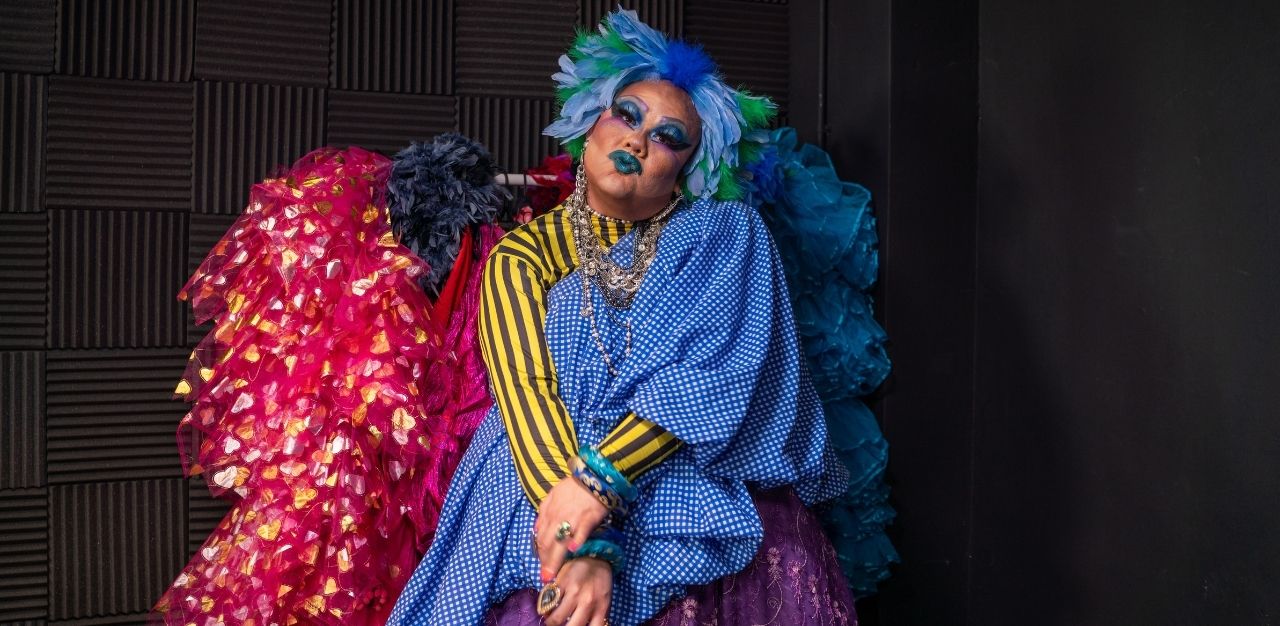
I don’t think it’s a misconception. It’s one of these things that, at its pinnacle, does not look like work. It’s deliberate in so many ways, including the fact that it’s deliberately not taking itself seriously. When we’re on [stage] and we’re not taking ourselves seriously, that’s infectious. And that’s what we want to have happen. But the flip side of that becomes, then is this actually work?
THG: Would you say like the reception towards drag has kind of changed from 2010 to now?
BDB: Oh, of course. As much as I would love to flatter myself and say it’s because I’ve been doing the show since 2015 and it’s a regular drag show, I would be crazy not to say there’s also been 13 seasons of RuPaul’s Drag Race. That has changed the landscape in lots of different ways. Both in terms of whether or not it’s “acceptable” or that people understand, but also that people have an imagination of what drag looks like.
But I would argue that that imagination is not always accurate because they have an imagination of a TV show, which is an abstraction of multiple cultures crammed into 90 minutes of entertainment. That’s quite different than being in a club and watching drag queens go at it.
THG: Could you tell us a little more about your efforts in advocacy, and activism as well?
BDB: I came of age in Boston because I worked in a queer activist theatre company. So for me, my every imagination of performing, gathering people, any of that stuff, or even being in a straight theatre watching a play, is potentially political. It’s this idea that people are going to gather around shared interests which has a lot of potential. That’s the first thing. And I got to be around some really incredible thinkers, activists and doers when I lived in Boston, who were making some really interesting social change out of the work that they were doing. So for me, I don’t think it’s possible to be queer, and a drag performer specifically, and not be inherently political. Question is: How much do you want to play with that consciously?
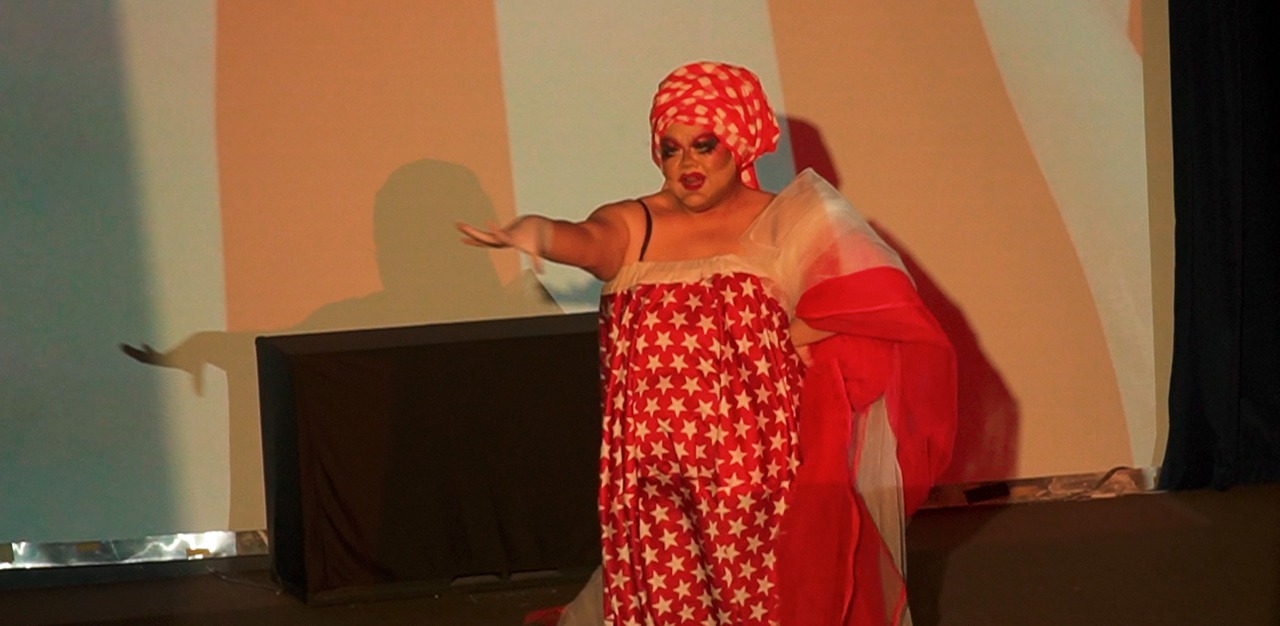
We’re in a country where my sex life is illegal. So, very publicly saying ‘this is what I look like’, putting our bodies out there and claiming our identities, is political, whether we like it or not. Part of it is also that the structures in which we exist, quite honestly, want us dead. It’s so ridiculous, that just being alive is, for some people, an achievement already.
How can we organise around the gathering of people and the exchange of ideas, which is very much what performers do anyway, perhaps in a different way, with talks and workshops? That’s what I want to do. I do that in Singapore with an organisation called IndigNation. It’s actually Singapore’s pride season, and has been since 15, 16 years ago. We’re in a bit of a refresh, a reimagining process. Because times have changed and the needs [and] landscape of activism in Singapore has changed.
That’s the stuff that I want to do. I enjoy thinking about these things, and exchanging ideas about these things with people.
THG: What are your hopes for the future?
BDB: I hope [drag] is always going to be fun, interesting and subversive, and that people are going to be constantly questioning how to make it [so]. As expressions of drag become mainstream, it becomes more challenging to be subversive because they have become received ways of doing drag. Not that it’s not valid to do drag in received ways, but a lot of the ethos of drag is resistance.
If it’s served to you in a similar manner, like ‘this is what it looks like to do drag’, how do you subvert that? You’re subverting not just the bigger world outside, and people, street culture and all that. Your work is also to subvert this mainstreaming, right. And that can be challenging. I hope we’re all still doing that because I find that so exciting.
Join the conversations on TheHomeGround Asia’s Facebook and Instagram, and get the latest updates via Telegram.



